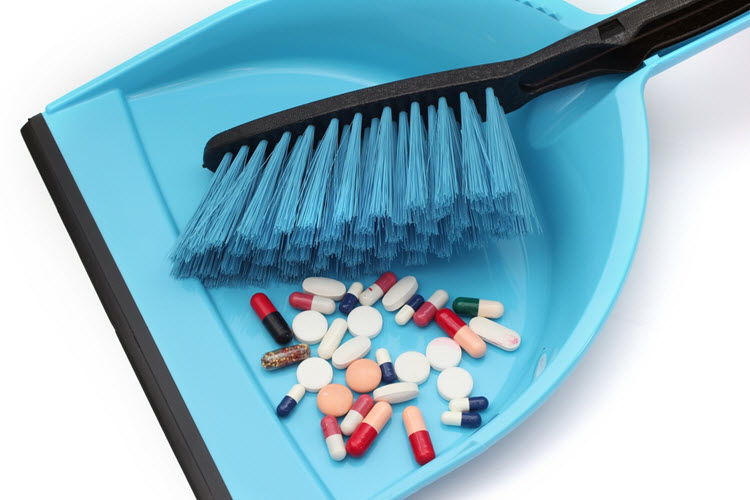And what about x-rays?
Dad was taking upwards of 16 prescription drugs a day when he died. Heart, renal, pulmonary, and primary care were just some of the doctor’s prescribing to manage his Congestive Heart Failure (CHF) and its complications. (Jump to Lessons Learned)
In the article (Three Tips for Taking Control of Medication), I talk about the complex process of prescribing drugs for a chronic illness. But I don’t address how to get rid of all these drugs. When dad died, it was easy enough to go through the medicine cabinet and his pill box to gather them, but what was the best way to dispose of them? I was determined not to flush them or pour liquids down the sink and risk polluting the environment.
Note: In New Jersey we have Project Medicine Drop boxes at police stations across the state. Run by the department of NJ Consumer Affairs, you can find more details at: Project Medicine Drop. FYI: You cannot put liquids, medical waste or syringes in these drop boxes.
If you don’t live in NJ, here are some recommendations for prescription drug disposal:
- Take them back to the pharmacy, but call first, not all pharmacies will take them back.
- Locate a DEA-authorized collector pharmacy in your area. The FDA website allows you to search on your zip code and state to find a pharmacy within a 5, 10, 20 and 50-mile radius. (DEA Lookup)
- Some larger pharmacy chains (e.g. Rite Aid, Walgreens, Safeway) have mail away programs. You purchase pre-paid mailers and the drugs get mailed back to an environmental returns program for proper disposal. Call to confirm that the Rite Aid, Walgreens or Safeway near you participates.
- According to the FDA website, if there are no medicine take-back programs or DEA-authorized pharmacies you can dispose of medicine in your household trash. (FDA Website)
- Do not crush tablets or capsules, mix them with something like kitty litter, used coffee grounds or dirt. Seal the mixture in a sealed plastic bag and throw it into your household trash. Scratch out all personal information on the label before disposing of the container.
Months later, I opened the medicine chest to find my father’s nitroglycerin spray. Now what? Nitroglycerin is not considered pharmaceutical waste by the FDA, but I still didn’t want to flush it into our drinking water. So… I called the pharmacy, who suggested I drop it off at a Project Medicine Drop box. But they don’t allow liquids. So I called NJ Consumer Affairs department who suggested I call the pharmacy. Are you seeing a pattern here? Since the pharmacy would not take it back, Consumer Affairs suggested I call the doctor. The office was completely baffled, no one had ever asked that question. Because I could not give it back to the pharmacy, it can’t go into my local medicine drop box and I was not about to flush it down the toilet, the office staff suggested putting paper towels into a plastic bag, pour the liquid in, seal it and put sealed the bag in the trash – done.
At least I thought I was done. Then I discovered old x-rays in dad’s office. Now what? It turns out there are no easy answers to this question if you have less than 50 lbs. Companies all over the country will take x-rays and even pay you for the silver they recover but, they have minimum weight levels. Here are some alternatives: Call the doctor who requested the x-rays or hospital x-ray department to see if they will recycle. Check your county recycle center or look for a private one to see if they recycle x-rays. My favorite? Give them to a crafter to make templates for quilts and stencils. Recently, I came across a company (B.W. Recycling, Inc. out of Florida) that takes them by mail. They dispose of the x-rays and will mail you a certificate of destruction if you include your contact information. (Recycling X-Rays)
- New Jersey’s Project Medicine Drop boxes may not be available on weekends. Months after dropping off the initial medication, I opened a drawer in dad’s office to find it FILLED with medication, some opened, some, unopened, some simply a different strength. It was a Saturday and, when I tried to drop it off at the local medicine drop box, the door was locked.Additional resources:
- http://PhillyVoice: Do You Have Unused Meds?
- http://DisposeMyMeds.org: Pharmacy Locator
- http://Earth911.com: How to Recycle Unwanted Medications
Disclaimer: The material in this blog is for educational purposes only. It is not intended to replace, nor does it replace, consulting with a physician, lawyer, accountant, financial planner or other qualified professional.
Jump To Top


Can I just start by thanking you for writing an article like this because it is very much needed! I think people make, generally, one of two big mistakes regarding their unused prescription drugs: they either DON’T get rid of them at all or they throw them in the trash or down the toilet. I love how you mentioned that you didn’t want to flush the nitroglycerin spray into water that would eventually be recycled for drinking. More people should realize that flushing pills down could be really bad for the community. Finally, I just want to remind people that keeping old pills (especially expired medication) is dangerous for you and your kids.
Hi Daelin,
I agree 100% that having expired medication around the house is dangerous to kids and other people in the family. (Even your pets!) Thanks so much for commenting on this article.
Deb